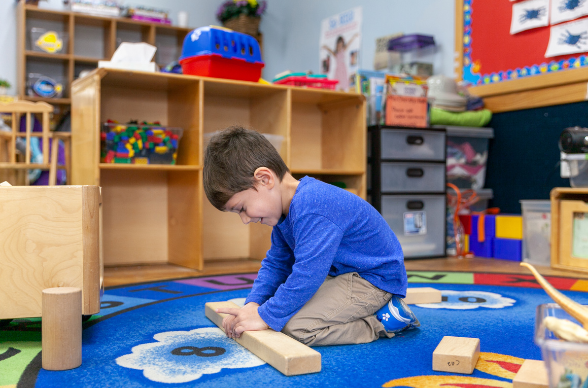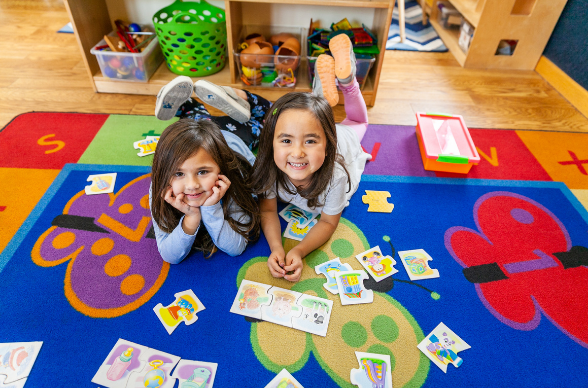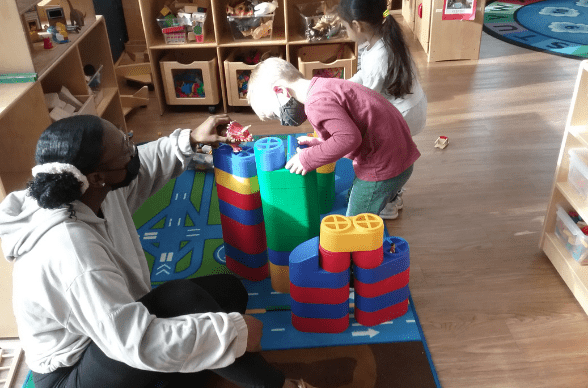10 Questions To Ask On Your Preschool Tour
If you are exploring school options for your preschool-aged child, you already know that education is a valuable investment in your child’s future. Preschool allows children to experiment, explore, and discover things through everyday play within a community that understands and celebrates their developing minds. While searching for a preschool may bring about a little anxiety for parents and children alike, the results of finding the right fit are life changing.
As a parent, you know that your child’s learning environment impacts much more than just academics. It also influences how they grow socially, emotionally, and physically. Research has shown that about 90% of brain development occurs during the first five years. This is a critical period of learning and growth, as how the brain grows is strongly influenced by what is happening in a child’s environment and their interactions with the people around them. Families who are able to find the right preschool see their children thrive in the classroom and beyond.
Does the school meet my child’s and family’s needs?
The school’s location and hours of operation should be convenient for your family. The curriculum should be research-based with unique, individualized instruction that ensures children are given guidance and flexibility in their learning process to learn at their own pace and enhance their academic growth. Socialization with peers should be encouraged so children can start learning relationship-building skills. Emphasis should be placed on creative and analytic skills, structure and routine, conflict resolution, independence, exposure to new things, and kindergarten readiness.
What is the school’s educational philosophy?
Preschool is often the time when young children develop a love of learning. The right preschool program should help your child grow and learn in ways that best suit his or her unique mind.
There are a range of educational philosophies available, and each approach varies in the way it supports a child’s creativity, memory, and understanding of the world around them. Preschools industry-wide aim to inspire young children. They incorporate music, art, and hands-on learning that will expand a child’s knowledge and cultivate their creativity. Children should be encouraged to make choices and practice individual decision-making.
What is the school’s approach to discipline?
All preschoolers are still developing social and emotional skills and learning to regulate their emotions. Good teachers build those skills with consistent routines and age-appropriate language to facilitate conflict resolution. Teachers should guide behavior in a positive direction using positive words and praise.
How much free play time do children have?
During a typical day, there should be both structured and unstructured periods, enabling children to learn at their own pace and also have time for free play. Outdoor time should occur at least twice daily.
Is the classroom fun and joyful?
Learning through play is critical for learning everything from vocabulary to math to self-control. Teachers should continually provide new activities and challenges, ask thought-provoking questions, and encourage children to think more deeply about things. Teachers should play music, showcase student artwork, read books to the children, use humor, give praise, and spend time outdoors with the children each day.
Do the staff seem supported and happy?
Preschool teachers introduce children to fundamental concepts, shapes, and symbols. They serve not only as educators but as social workers, referees, coaches, and nurses, guiding their students through the challenges of sharing and taking turns, practicing good hygiene, controlling their emotions, and so much more. The physical, emotional, and mental demands of the job can be tough.
Teachers feel more supported when they receive regular professional development and adequate planning time. When directors are able to foster a sense of community for teachers, this facilitates more happiness, positive attitudes, and satisfaction toward teaching,
Do the staff speak to children in nurturing and encouraging ways?
It’s important that teachers get down to a child’s eye level, address children by name, speak in a soft, caring tone, listen carefully, and seek to understand. Positive relationships can be difficult to define but they are easy to see.
What health and safety measures do you have in place?
Health and safety should be top priority. Measures such as frequent hand washing with soap and water, enhanced sanitization procedures with focus on toys, supplies, and high-touch areas, and ongoing compliance with CDC and Maryland Department of Health guidelines should be strictly enforced. School facilities should be designed for maximum security, with locked doors, PIN access, and stringent drop-off and pick-up procedures.
Are the children active?
Preschool children should not be expected to sit for long periods of time. They should get plenty of outdoor time. Children should get to choose their activities, and artwork and other documentation of their learning experiences should be displayed around the classroom.
What credentials and training do the teachers have?
Teachers should meet the state requirements for child care certification, which can include a degree in Early Childhood Education or another related field, and prior experience working with children in a licensed child care setting.
See 10 Questions To Ask On Your Private School Tour for more helpful tips.
Schedule Your Virtual Tour and Have Your Questions Answered
Ready to schedule your virtual tour at Columbia Academy? We can’t wait to meet you and answer your questions!

